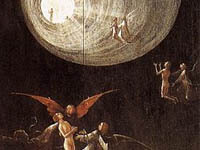Are the Russian people Russia's enemy No. 1?
 "Immediately after the tribulation of those days the sun will be darkened, and the moon will not give its light, and the stars will fall from heaven, and the powers of the heavens will be shaken" (Matthew 24:29).
"Immediately after the tribulation of those days the sun will be darkened, and the moon will not give its light, and the stars will fall from heaven, and the powers of the heavens will be shaken" (Matthew 24:29).

Humans were enchanted with apocalyptic forecasts even long before Christ. It's enough to take a look at the list of apocalyptic dates on Wikipedia to realize that this is a moth-eaten idea. This is a matter of eternal and even childish curiosity, which makes some people read books from the last page. In some religions, Apocalypse does not exist per se. It some others - in Hinduism, for example, it is cyclic: the world does not die after the catastrophe, but continues to live.
John Chrysostom, one of the founding fathers of the Church, believed that Apocalypse would come before 600 A.C. As we can see, the father was wrong. However, his mistake could only confirm the words from Jesus Christ, who said: "But concerning that day or that hour, no one knows, not even the angels in heaven, nor the Son, but only the Father."
In Christian eschatology, Apocalypse depends on all of us - on humans. The mystery of lawlessness, of which Apostle Paul spoke, depends on the spiritual and moral condition of mankind, not vice versa.
"Apocalyptic sentiments" on post-Soviet space are connected with objective circumstances. Two horrific wars, political repressions, hunger and the collapse of two empires in Russia in only 100 years have shattered the society indeed. All of those events can make anyone believe in Apocalypse. However, every thought requires analysis.
So what do we have? The country broke up, the national economy entirely depends on raw materials, the population is demoralized. There are vestiges of stability and hopes of revival, of course, but they do not set the general trend (alas). We have the usual set of fear and complexes, connected with our recognition (directly or indirectly) of the predominance of the West in practically every field. All these fears stretch from purely economic to the military, political capture and the destruction of Russia (Ukraine, Belarus, Kazakhstan, etc).
However, any kind of fear requires a rational approach and assessment to have a reasonable (at least) reaction to them. Why aren't we afraid of fire or electricity? It's because we know how to handle them properly. Does that mean that Russia needs to learn how to handle the West properly and follow those simple rules too?
How does the West put pressure on Russia?
I'd rather not say anything about the military threat, just because the Soviet Empire sank into oblivion as a result of the artfully conducted propaganda, even though the defense power of that Empire was indestructible. I would not be saying anything about the ideological pressure either. The Soviet Union did not collapse just because capitalism was attractive and humane. It collapsed because the needs of the people were utterly forgotten. The government was preoccupied with the creation of superweapons, while the people had to get used to the fact that they'd have to work hard to get essential goods.
We should be ashamed. We are all sitting on the chest full of treasures, but we cannot open it just because we are sitting on it. Our people are wonderful entrepreneurs. They have creative approach and broad outlook of the world, which is not so typical of the West. Russia needs to build the society which would be based on the development of education and science. If we can not do it, we do not have to blame the West for it. The mirror on the wall is not guilty of what it reflects. There is no use to struggle with the mirror either.
The conclusion seems to be unpromising. We are back to square one, but we need to stop waiting for the moment when we finally find the magic wand that will do everything we want. Or are the Russian people Russia's enemy No. 1?
Aleksei Derkunsky
Pravda.Ru
Subscribe to Pravda.Ru Telegram channel, Facebook, RSS!

